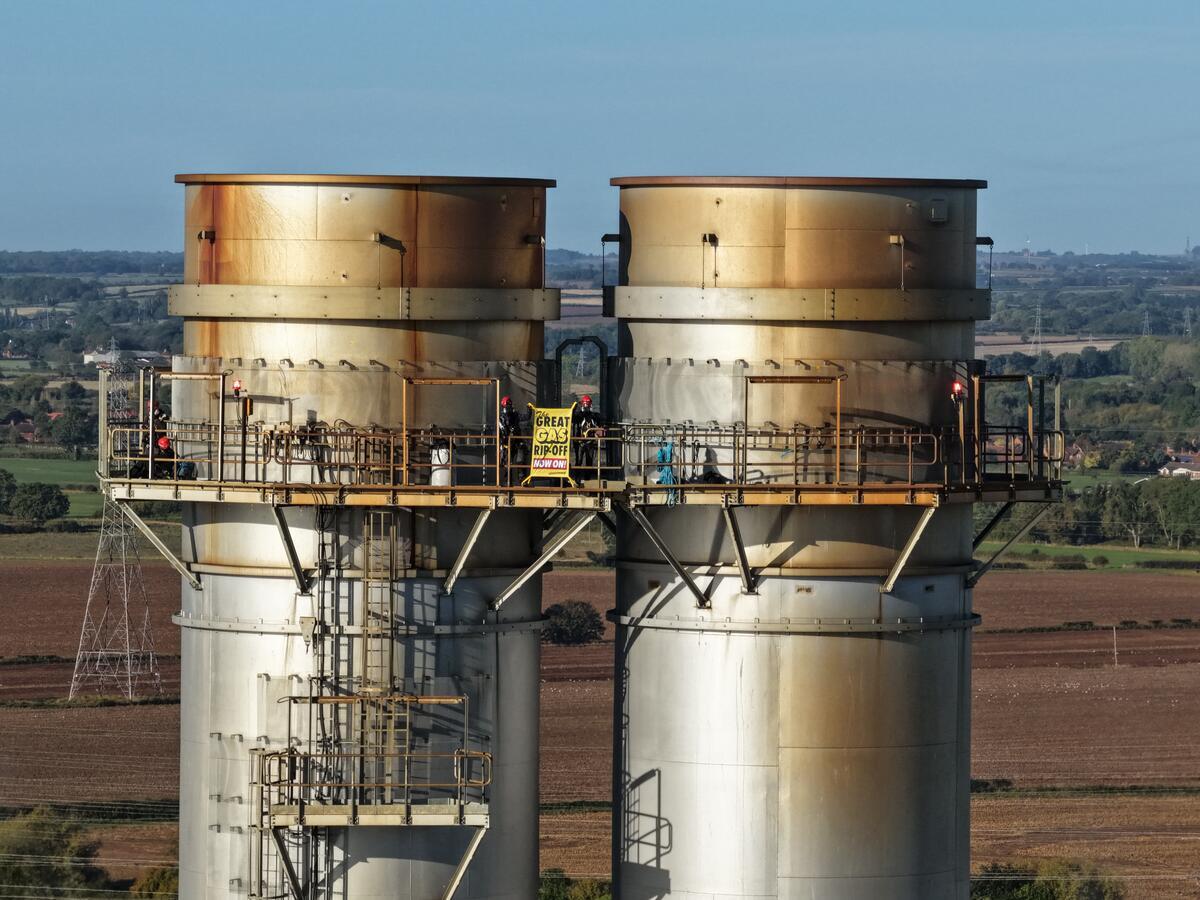
- Press Release
Greenpeace activists scale power station’s 75-metre chimney stacks to protest ‘The Great Gas Rip-Off’
Campaigners demand energy reforms to stop expensive gas from setting electricity prices and pushing up bills
This morning eight climbers from Greenpeace UK have scaled two 75m-high chimney stacks at England’s largest gas-fired power station to expose the role expensive gas plays in setting electricity prices and pushing up bills.
The activists climbed the two chimney stacks at Staythorpe Power Station in Nottinghamshire – which is owned by the German energy giant, RWE – using the maintenance ladder rungs. They are now standing on gantries displaying a banner reading: ‘The Great Gas Rip-Off: Now On!’.
Even though gas supplied just 30% of the UK’s electricity last year, gas-fired power stations – like Staythorpe – still set the price we pay for power almost all the time. In 2021, gas set the price 97% of the time.
That’s because, under the UK’s electricity pricing system, the most expensive source of power – usually gas – sets the price for all electricity.
Our gas-dependent power generation can also lead to extreme profiteering through balancing payments. Last winter, two gas plants were paid almost £18m for generating just three hours’ worth of power alone, exploiting their ability to set high prices when supply is tight.
“I shouldn’t be climbing on power stations. But something has to change.”
Speaking about his involvement in the protest, Vincent McGoldrick, a 68-year-old retiree and former volunteer hospice driver, who is one of the activists on the chimney stacks, said:
“I’m a pensioner – I shouldn’t be climbing on power stations. But something has to happen – something has to change. We’re all being ripped off by these greedy gas companies and it’s the poorest in society that are bearing the brunt of sky-high electricity prices.
“Millions of families are struggling to keep the lights on or heat their homes. This has a knock-on effect on our health, our children’s education, and it’s costing the NHS millions. I have six grandchildren, I want a better future for them than what’s currently on offer – I can’t just sit by and do nothing.”
Over the past five years, gas-driven electricity prices have averaged 130% higher than solar, 29% higher than onshore wind, and 13% higher than offshore wind. That’s meant bigger profits for gas generators and bigger bills for households and businesses.
During the recent energy crisis, the huge spike in global gas prices added an estimated £90 billion onto UK gas bills between 2021 and 2024, equivalent to £1,300 per person.
As a result, UK electricity prices are now among the highest in Europe – and far higher than in the US. For energy-intensive industries, they’re some of the highest in the world.
“The government could stop this today”
Greenpeace UK’s campaigner, Lily-Rose Ellis, said:
“Most people have absolutely no idea that expensive gas is still setting the price of electricity – it’s time they knew the truth.
“Right across the country, people are struggling to pay their bills, while the gas giants running our power stations rake in huge profits.
“The government could stop this today – by ending the system that lets expensive gas set electricity prices. By taking control of our energy system we can lower bills, help tackle climate change, and make sure our power works for people, not for corporate greed.”
How to end the Great Gas Rip-Off
Earlier this month, Greenpeace UK published a report setting out how the government could save households and businesses £5.1 billion a year on their energy bills, by removing gas-fired power plants from the wholesale electricity to stop gas from setting prices.
The reforms would also shield British households and businesses from gas price volatility, like those experienced during the recent energy crisis.
Greenpeace’s approach to protest
In order to minimise any disruption caused, this protest is being executed at a time when there is plenty of supply on the energy system. The climbers also plan to stay on the chimney stacks for no longer than necessary to highlight the central role that gas-fired power stations play in driving up the cost of electricity for British households and businesses.
As well as industry-standard climbing safety gear, the activists are all wearing personal protective equipment (PPE) including facemasks and respirators, and are equipped with gas monitors to ensure their safety.
Contact: Greenpeace UK Press Office – press.uk@greenpeace.org or 020 7865 8255
Notes to editor:
- Photos and videos of the action are available here
- Interviews available with activists up the stacks at the power station, as well as Greenpeace campaigners – please contact press.uk@greenpeace.org or call 020 7865 8255 to arrange.
